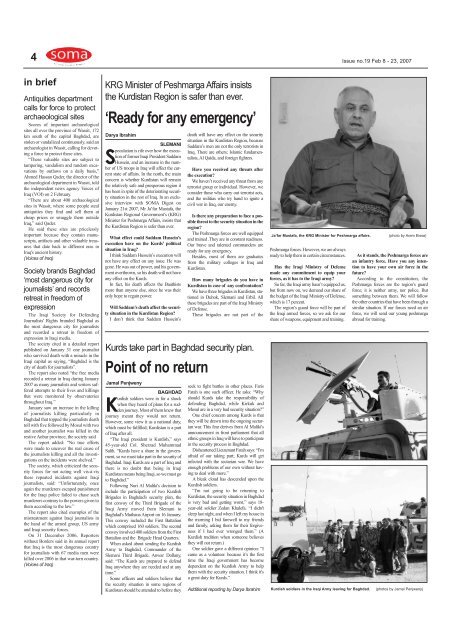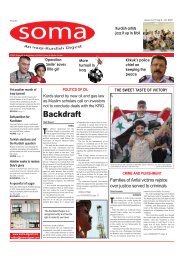Turkish interference A peaceful Ashura - Soma Digest
Turkish interference A peaceful Ashura - Soma Digest
Turkish interference A peaceful Ashura - Soma Digest
You also want an ePaper? Increase the reach of your titles
YUMPU automatically turns print PDFs into web optimized ePapers that Google loves.
4 Issue no.19 Feb 8 - 23, 2007<br />
in brief<br />
Antiquities department<br />
calls for force to protect<br />
archaeological sites<br />
Scores of important archaeological<br />
sites all over the province of Wassit, 172<br />
km south of the capital Baghdad, are<br />
stolen or vandalized continuously, said an<br />
archaeologist in Wassit, calling for devoting<br />
a force to protect these sites.<br />
“These valuable sites are subject to<br />
tampering, vandalism and random excavations<br />
by outlaws on a daily basis,”<br />
Ahmed Hassan Qader, the director of the<br />
archaeological department in Wassit, told<br />
the independent news agency Voices of<br />
Iraq (VOI) on 2 February.<br />
“There are about 400 archaeological<br />
sites in Wassit, where some people steal<br />
antiquities they find and sell them at<br />
cheap prices or smuggle them outside<br />
Iraq,” said Qader.<br />
He said these sites are pricelessly<br />
important because they contain manuscripts,<br />
artifacts and other valuable treasures<br />
that date back to different eras in<br />
Iraq's ancient history.<br />
(Voices of Iraq)<br />
Society brands Baghdad<br />
‘most dangerous city for<br />
journalists’ and records<br />
retreat in freedom of<br />
expression<br />
The Iraqi Society for Defending<br />
Journalists' Rights branded Baghdad as<br />
the most dangerous city for journalists<br />
and recorded a retreat in freedom of<br />
expression in Iraqi media.<br />
The society cited in a detailed report<br />
published on January 31 one journalist<br />
who survived death with a miracle in the<br />
Iraqi capital as saying, “Baghdad is the<br />
city of death for journalists”.<br />
The report also noted “the free media<br />
recorded a retreat in Iraq during January<br />
2007 as many journalists and writers suffered<br />
attempts to their lives and killings<br />
that were monitored by observatories<br />
throughout Iraq.”<br />
January saw an increase in the killing<br />
of journalists killing particularly in<br />
Baghdad that topped the journalists death<br />
toll with five followed by Mosul with two<br />
and another journalist was killed in the<br />
restive Anbar province, the society said<br />
The report added: “No true efforts<br />
were made to uncover the real cause of<br />
the journalists killing and all the investigations<br />
on the incidents were shelved.”<br />
The society, which criticized the security<br />
forces for not acting well vis-à-vis<br />
these repeated incidents against Iraqi<br />
journalists, said: “Unfortunately, once<br />
again the murderers escaped punishment<br />
for the Iraqi police failed to chase such<br />
murderers contrary to the powers given to<br />
them according to the law.”<br />
The report also cited examples of the<br />
mistreatment against Iraqi journalists in<br />
the hand of the armed group, US army<br />
and Iraqi security forces.<br />
On 31 December 2006, Reporters<br />
without Borders said in its annual report<br />
that Iraq is the most dangerous country<br />
for journalists with 67 media men were<br />
killed over 2006 in that war-torn country.<br />
(Voices of Iraq)<br />
KRG Minister of Peshmarga Affairs insists<br />
the Kurdistan Region is safer than ever.<br />
‘Ready for any emergency’<br />
Darya Ibrahim<br />
SLEMANI<br />
Speculation is rife over how the execution<br />
of former Iraqi President Saddam<br />
Hussein, and an increase in the number<br />
of US troops in Iraq will affect the current<br />
state of affairs. In the north, the main<br />
concern is whether Kurdistan will remain<br />
the relatively safe and prosperous region it<br />
has been in spite of the deteriorating security<br />
situation in the rest of Iraq. In an exclusive<br />
interview with SOMA <strong>Digest</strong> on<br />
January 21st 2007, Mr Ja’far Mustafa, the<br />
Kurdistan Regional Government’s (KRG)<br />
Minister for Peshmarga Affairs, insists that<br />
the Kurdistan Region is safer than ever.<br />
What effect could Saddam Hussein’s<br />
execution have on the Kurds’ political<br />
situation in Iraq?<br />
I think Saddam Hussein’s execution will<br />
not have any effect on any issue. He was<br />
gone. He was out of power, and his government<br />
overthrown, so his death will not have<br />
any effect on the Kurds.<br />
In fact, his death affects the Baathists<br />
more than anyone else, since he was their<br />
only hope to regain power.<br />
Will Saddam’s death affect the security<br />
situation in the Kurdistan Region?<br />
I don’t think that Saddam Hussein’s<br />
death will have any effect on the security<br />
situation in the Kurdistan Region, because<br />
Saddam’s men are not the only terrorists in<br />
Iraq. There are others; Islamic fundamentalists,<br />
Al Qaida, and foreign fighters.<br />
Have you received any threats after<br />
the execution?<br />
We haven’t received any threat from any<br />
terrorist group or individual. However, we<br />
consider those who carry out terrorist acts,<br />
and the militias who try hand to ignite a<br />
civil war in Iraq, our enemy.<br />
Is there any preparation to face a possible<br />
threat to the security situation in the<br />
region?<br />
The Peshmarga forces are well equipped<br />
and trained .They are in constant readiness.<br />
Our brave and talented commanders are<br />
ready for any emergency.<br />
Besides, most of them are graduates<br />
from the military colleges in Iraq and<br />
Kurdistan.<br />
How many brigades do you have in<br />
Kurdistan in case of any confrontation?<br />
We have three brigades in Kurdistan, stationed<br />
in Duhok, Slemani and Erbil. All<br />
these brigades are part of the Iraqi Ministry<br />
of Defense.<br />
These brigades are not part of the<br />
Kurds take part in Baghdad security plan.<br />
Point of no return<br />
Jamal Penjweny<br />
BAGHDAD<br />
Kurdish soldiers were in for a shock<br />
when they heard of plans for a sudden<br />
journey. Most of them knew that<br />
journey meant they would not return.<br />
However, some view it as a national duty,<br />
which must be fulfilled; Kurdistan is a part<br />
of Iraq after all.<br />
“The Iraqi president is Kurdish,” says<br />
45-year-old Col. Sherzad Muhammad<br />
Salih. “Kurds have a share in the government,<br />
so we must take part in the security of<br />
Baghdad. Iraqi Kurds are a part of Iraq and<br />
there is no doubt that being in Iraqi<br />
Kurdistan means being Iraqi, so we must go<br />
to Baghdad.”<br />
Following Nuri Al Maliki's decision to<br />
include the participation of two Kurdish<br />
Brigades in Baghdad's security plan, the<br />
first convoy of the Third Brigade of the<br />
Iraqi Army moved from Slemani to<br />
Baghdad's Muthana Airport on 16 January.<br />
This convoy included the First Battalion<br />
which comprised 160 soldiers. The second<br />
convoy involved 400 soldiers from the First<br />
Battalion and the Brigade Head Quarters.<br />
When asked about sending the Kurdish<br />
Army to Baghdad, Commander of the<br />
Slemani Third Brigade, Anwar Dollany,<br />
said: “The Kurds are prepared to defend<br />
Iraq anywhere they are needed and at any<br />
time.”<br />
Some officers and soldiers believe that<br />
the security situation in some regions of<br />
Kurdistan should be attended to before they<br />
seek to fight battles in other places. Faris<br />
Fatah is one such officer. He asks: “Why<br />
should Kurds take the responsibility of<br />
defending Baghdad, while Kirkuk and<br />
Mosul are in a very bad security situation?”<br />
One chief concern among Kurds is that<br />
they will be drawn into the ongoing sectarian<br />
war. This fear derives from Al Maliki's<br />
announcement in front parliament that all<br />
ethnic groups in Iraq will have to participate<br />
in the security process in Baghdad.<br />
Disheartened Lieutenant Fatah says: “I'm<br />
afraid of our taking part; Kurds will get<br />
infected with the sectarian war. We have<br />
enough problems of our own without having<br />
to deal with more.”<br />
A bleak cloud has descended upon the<br />
Kurdish soldiers.<br />
“I'm not going to be returning to<br />
Kurdistan, the security situation in Baghdad<br />
is very bad and getting worst,” says 18year-old<br />
soldier Zedan Khalefa. “I didn't<br />
sleep last night, and when I left my house in<br />
the morning I bid farewell to my friends<br />
and family, asking them for their forgiveness<br />
if I had ever wronged them.” (A<br />
Kurdish tradition when someone believes<br />
they will not return.)<br />
One soldier gave a different opinion: “I<br />
came as a volunteer. because it’s the first<br />
time the Iraqi government has become<br />
dependent on the Kurdish Army to help<br />
them with the security situation. I think it's<br />
a great duty for Kurds.”<br />
Additional reporting by Darya Ibrahim<br />
Ja’far Mustafa, the KRG Minister for Peshmarga affairs. (photo by Aram Eissa)<br />
Peshmarga forces. However, we are always<br />
ready to help them in certain circumstances.<br />
Has the Iraqi Ministry of Defense<br />
made any commitment to equip your<br />
forces, as it has to the Iraqi army?<br />
So far, the Iraqi army hasn’t equipped us,<br />
but from now on, we demand our share of<br />
the budget of the Iraqi Ministry of Defense,<br />
which is 17 percent.<br />
The region’s guard force will be part of<br />
the Iraqi armed forces, so we ask for our<br />
share of weapons, equipment and training.<br />
As it stands, the Peshmarga forces are<br />
an infantry force. Have you any intention<br />
to have your own air force in the<br />
future?<br />
According to the constitution, the<br />
Peshmarga forces are the region’s guard<br />
force; it is neither army, nor police. But<br />
something between them. We will follow<br />
the other countries that have been through a<br />
similar situation. If our forces need an air<br />
force, we will send our young peshmarga<br />
abroad for training.<br />
Kurdish soldiers in the Iraqi Army leaving for Baghdad. (photos by Jamal Penjweny)



